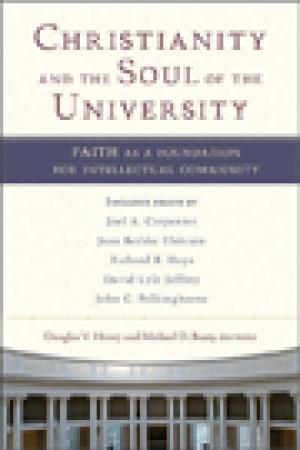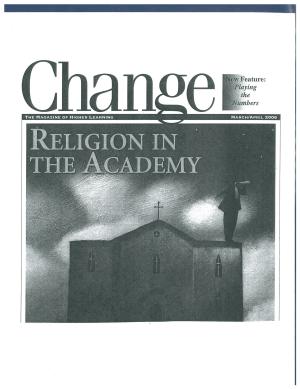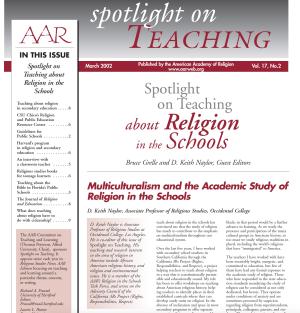Resources
This note from the classroom explores teaching new or alternative religions within the context of a Roman Catholic Liberal Arts College. The essay will specifically focus on a section of a course entitled "Modern Religious Movements" in which students were asked to consider different methodological approaches to the teaching and study of Scientology and the Catholic cult of the Virgin Mary. This note from the classroom details how this rather unexpected comparison prompted students to reconsider the category cult and argues that encouraging self-reflexivity in a largely Catholic classroom can become a crucial means for engaging a broader discussion of new religions, cult discourse, and the academic study of religion itself.

Leading scholars explore the role of faith in the university setting. (From the Publisher)

Journal Issue
The purpose of the study reported in this paper was to develop a working definition of service-learning, identify the best practices of service-learning in the context of Christian colleges and universities and, based upon that information, develop a model for replication. The study undertaken included: (a) examination of the findings of unpublished data from a survey on service-learning at 90 Christian colleges and universities and notes from a conference on service-learning at faith-based institutions; (b) a thorough review of the literature on service-learning and the mission and purpose of Christian higher education; and (c) interviews with practitioners from seven Christian colleges or universities that met prescribed criteria for best practices in service-learning, A content analysis resulted in a comprehensive definition of service-learning, key elements of best practices in service-learning, and a model which incorporates guidelines for Christian colleges and universities to use when developing service-learning programs. The comprehensive definition incorporates characteristics from previous definitions, but includes an added component of institutional support for service-learning. The best practices in service-learning in Christian higher education corroborate this finding and include key elements. The model for designing a service-learning program at a Christian college builds further upon the definition and best practices and includes eight guidelines. The model guidelines are meant to address the philosophical and practical implications in designing an effective service-learning course and program in Christian institutions of learning. The data from this study strongly suggest that Christian colleges and universities should implement service-learning as a means of furthering their faith-based missions through their curricula. (From the Publisher)
This paper explores the place of religion within the assumptions of the modern research university. The issue for Christianity is essentially epistemic: Given the criteria for truth or plausibility that prevail in advanced academic communities, what are the warrants for Christian belief? Are the prevailing criteria defined such that Christian claims can have no epistemic standing? The modern-day clash between Christianity and academic discourse go to the heart of the differing projects. For the academy, issues are admitted at arm's length, while Christianity moves beyond discussion to decision, to trust and to faith. This paper is not another screed against the modern university. Instead, the author regards the modern university as one of the great inventions of the human mind, and the university today can boast of its humanistic ideology. The author considers the sciences and arts as marvels of human ingenuity and emotional insight. The place of Christian belief within academic humanism is pondered. (From the Publisher)
Prayer is a primary spiritual discipline for Christians. Nonetheless, few contemporary scholarly discussions have ventured into exploring the role of prayer in college teaching. This paper extends the conversation by reviving three themes in writings about prayer and academics and making application of those themes to teaching and learning today. (From the Publisher)

Journal issue. Full text is available online.